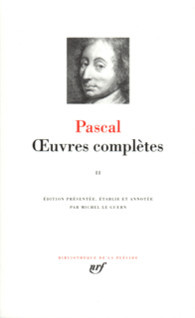Oeuvres complètes, tome 2
by Blaise Pascal
«Cet effrayant génie», dit Chateaubriand. L'impression dominante n'est pourtant pas l'effroi, mais la fascination. Une fascination que les siècles n'altèrent pas et que Pascal explique lui-même : «On s'attendait de voir un auteur et on trouve un homme». Pascal ne se comporte pas en auteur, il ne construit pas une œuvre littéraire : il se contente de répondre aux sollicitations de Port-Royal, et de se battre pour la vérité, scientifique, morale, religieuse.
À côté des Provinciales et des autres polémiques religieuses, le premier volume de cette nouvelle édition des Œuvres complètes de Pascal contient des documents sur le personnage, ses travaux touchant la géométrie, les probabilités, l'arithmétique (dont la célèbre «machine arithmétique») et la physique - tous textes qui, pour être ceux d'un scientifique de génie, n'ne sont pas moins écrits dans la langue d'un honnête homme.
Outre des Lettres, différents Opuscules et autres écrits, le tome II et dernier contient les Pensées.
Les Pensées sont les papiers d'un mort. Non pas une œuvre posthume. Nous n'avons pas l'œuvre, mais nous avons l'atelier.
Depuis trois siècles, les interprétations n'ont pas manqué. Si les Pensées ont continué à susciter un intérêt aussi aigu, c'est que chaque époque les a comprises de manière différente.
Puisque les Pensées sont les papiers d'un mort, il faut les présenter dans l'état où on les a trouvées, dans le même ordre, même si l'on n'y voit que désordre, et se laisser prendre par leur vertige.
À côté des Provinciales et des autres polémiques religieuses, le premier volume de cette nouvelle édition des Œuvres complètes de Pascal contient des documents sur le personnage, ses travaux touchant la géométrie, les probabilités, l'arithmétique (dont la célèbre «machine arithmétique») et la physique - tous textes qui, pour être ceux d'un scientifique de génie, n'ne sont pas moins écrits dans la langue d'un honnête homme.
Outre des Lettres, différents Opuscules et autres écrits, le tome II et dernier contient les Pensées.
Les Pensées sont les papiers d'un mort. Non pas une œuvre posthume. Nous n'avons pas l'œuvre, mais nous avons l'atelier.
Depuis trois siècles, les interprétations n'ont pas manqué. Si les Pensées ont continué à susciter un intérêt aussi aigu, c'est que chaque époque les a comprises de manière différente.
Puisque les Pensées sont les papiers d'un mort, il faut les présenter dans l'état où on les a trouvées, dans le même ordre, même si l'on n'y voit que désordre, et se laisser prendre par leur vertige.
BUY NOW
Leather Bound, Bibliothèque de la Pléiade , 1728 pages
Published 2000 by Gallimard
© 2026 Bibleportal.com 版权所有.

Among the contemporaries of Descartes none displayed greater natural genius than Pascal, but his mathematical reputation rests more on what he might have done than on what he actually effected, as during a considerable part of his life he deemed it his duty to devote his whole time to religious exercises.
At 16, Pascal began designing a calculating machine, which he finally perfected when he was thirty, the pascaline, a beautiful handcrafted box about fourteen by five by three inches. The first accurate mechanical calculator was born.
Pascal was dismayed and disgusted by society's reactions to his machine and completely renounced his interest in science an mathematics, devoting the rest of his life to God. He is best known for his collection of spiritual essays, Les Pensees.
Ironically, Pascal, who was a genius by any measure, with one of the finest brains of all time, died of a brain hemorrhage at the age of 39.
Among the contemporaries of Descartes none displayed greater natural genius than Pascal, but his mathematical reputation rests more on what he might have done than on what he actually effected, as during a considerable part of his life he deemed it his duty to devote his whole time to religious exercises.
He was a child prodigy who was educated by his father, a Tax Collector in Rouen. Pascal's earliest work was in the natural and applied sciences where he made important contributions to the study of fluids, and clarified the concepts of pressure and vacuum by generalizing the work of Evangelista Torricelli.
In 1646, he and his sister Jacqueline identified with the religious movement within Catholicism known by its detractors as Jansenism. Following a mystical experience in late 1654, he had his "second conversion", abandoned his scientific work, and devoted himself to philosophy and theology. His two most famous works date from this period: the Lettres provinciales and the Pensees.
In honor of his scientific contributions, the name Pascal has been given to the SI unit of pressure, to a programming language, and Pascal's law (an important principle of hydrostatics), and as mentioned above, Pascal's triangle and Pascal's wager still bear his name.
... Show more